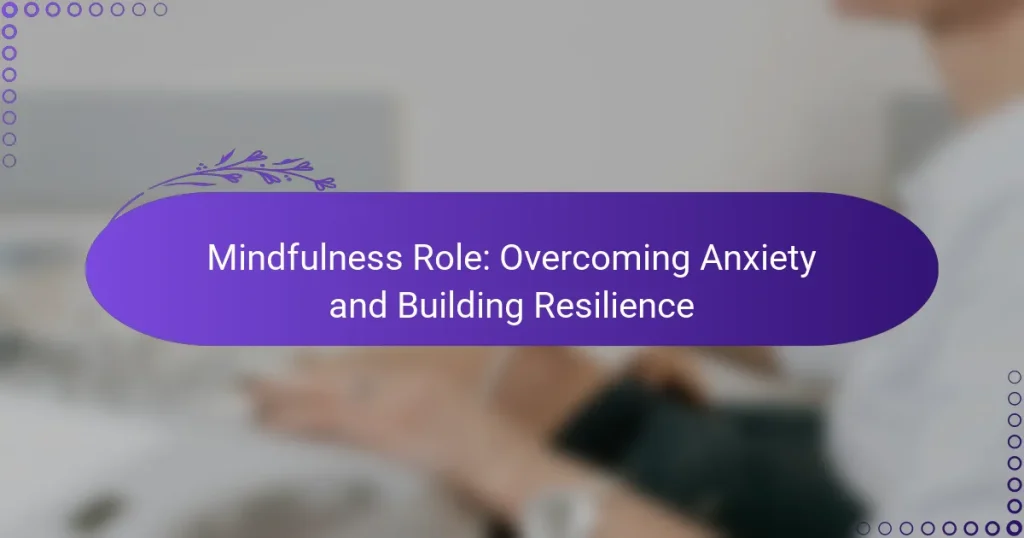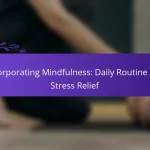Mindfulness is a powerful tool for overcoming anxiety and building resilience by fostering present-moment awareness. By engaging in practices such as mindful breathing and body scan meditation, individuals can reduce stress and cultivate a sense of calm, making it easier to manage anxious thoughts. This approach not only helps in alleviating anxiety but also enhances one’s ability to navigate life’s challenges with greater ease and adaptability.
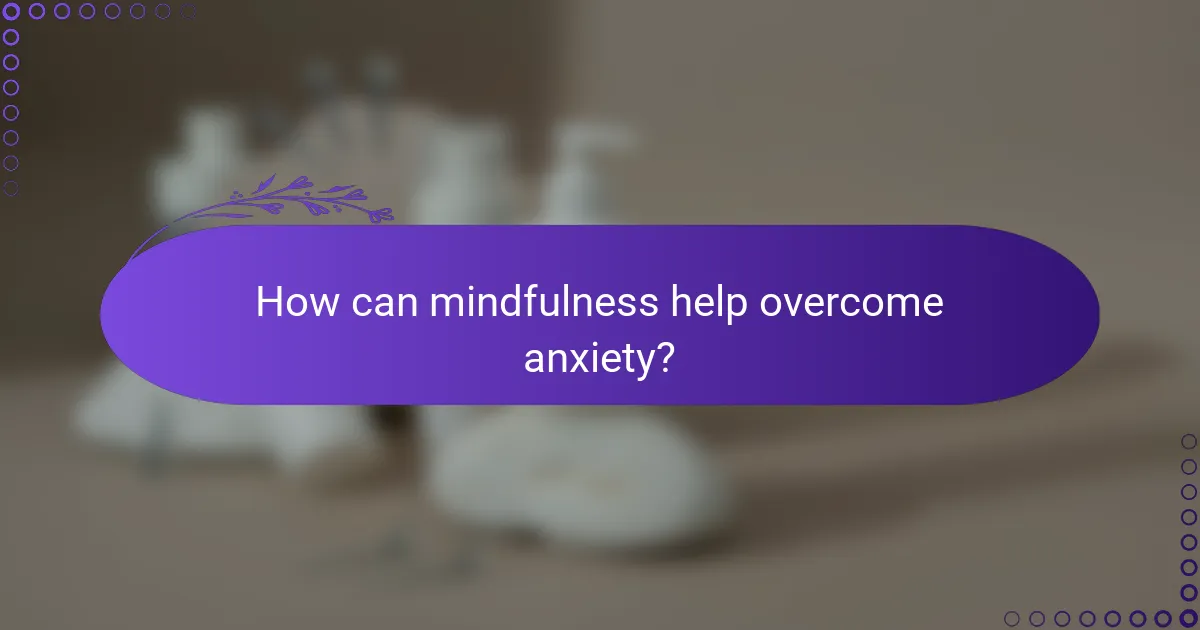
How can mindfulness help overcome anxiety?
Mindfulness can significantly help in overcoming anxiety by promoting awareness of the present moment, which reduces the tendency to ruminate on past events or worry about the future. By practicing mindfulness, individuals can cultivate a sense of calm and control, making it easier to manage anxious thoughts and feelings.
Reduces stress levels
Mindfulness practices, such as meditation and deep breathing, are effective in lowering stress levels. These techniques encourage relaxation and help individuals detach from stressors, leading to a more balanced emotional state. Regular practice can result in noticeable reductions in stress, often within a few weeks.
To incorporate mindfulness into your routine, consider setting aside just a few minutes each day for focused breathing or meditation. This can help create a buffer against daily stressors.
Enhances emotional regulation
Mindfulness enhances emotional regulation by fostering a greater awareness of one’s thoughts and feelings. This awareness allows individuals to respond to emotions more thoughtfully rather than react impulsively. Over time, this practice can lead to improved emotional resilience.
Engaging in mindfulness exercises can help identify triggers for anxiety and develop healthier coping strategies. For example, journaling about emotional experiences can clarify feelings and promote better responses.
Improves focus and clarity
Practicing mindfulness improves focus and mental clarity by training the mind to concentrate on the present moment. This heightened focus reduces distractions and enhances cognitive performance, which can be particularly beneficial in high-pressure situations.
To boost focus, try mindfulness techniques such as the Pomodoro Technique, where you work for a set period followed by short breaks. This method can help maintain attention while reducing feelings of overwhelm.
Promotes relaxation techniques
Mindfulness promotes various relaxation techniques that can alleviate anxiety symptoms. Techniques such as progressive muscle relaxation and guided imagery can help calm the mind and body, making it easier to manage anxiety.
Consider integrating these techniques into your daily routine. For instance, practicing progressive muscle relaxation before bed can improve sleep quality and reduce nighttime anxiety, leading to a more restful night.
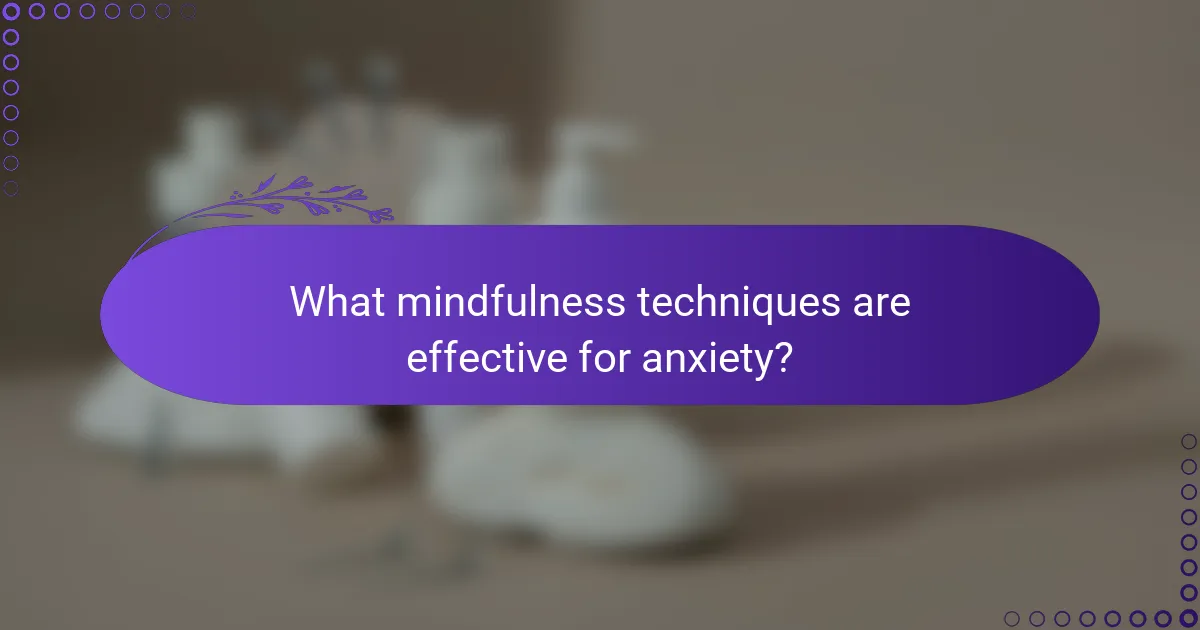
What mindfulness techniques are effective for anxiety?
Mindfulness techniques can significantly reduce anxiety by promoting present-moment awareness and relaxation. Effective methods include mindful breathing, body scan meditation, guided imagery, and mindful walking, each offering unique benefits for managing stress and enhancing resilience.
Mindful breathing exercises
Mindful breathing exercises focus on the breath as a way to anchor your attention and calm the mind. To practice, find a comfortable position, close your eyes, and take deep, slow breaths, paying attention to the sensation of air entering and leaving your body.
Start with sessions of 5-10 minutes, gradually increasing the duration as you become more comfortable. A common pitfall is allowing your mind to wander; gently redirect your focus back to your breath whenever this happens.
Body scan meditation
Body scan meditation involves systematically focusing on different parts of the body to promote relaxation and awareness. Begin by lying down comfortably and directing your attention to your toes, then slowly move up through your body, noticing any sensations or tension.
This practice can take anywhere from 10 to 30 minutes. It’s beneficial to do this in a quiet environment to minimize distractions. If you notice discomfort, acknowledge it without judgment and continue the scan.
Guided imagery practices
Guided imagery practices use visualization to create calming mental images that can help reduce anxiety. You might imagine a peaceful beach or a serene forest, engaging all your senses to enhance the experience.
These sessions can last from 5 to 20 minutes and can be done with the help of audio recordings or apps. Ensure you choose imagery that resonates with you personally, as this will enhance the effectiveness of the practice.
Mindful walking
Mindful walking combines physical movement with mindfulness, allowing you to focus on the sensations of walking and the environment around you. As you walk, pay attention to each step, the feeling of your feet on the ground, and the rhythm of your breath.
Start with short walks of 10-15 minutes, gradually increasing the distance or duration. Avoid distractions like phones or music to fully engage in the experience. This practice can be particularly effective in natural settings, where the surroundings can enhance your mindfulness.
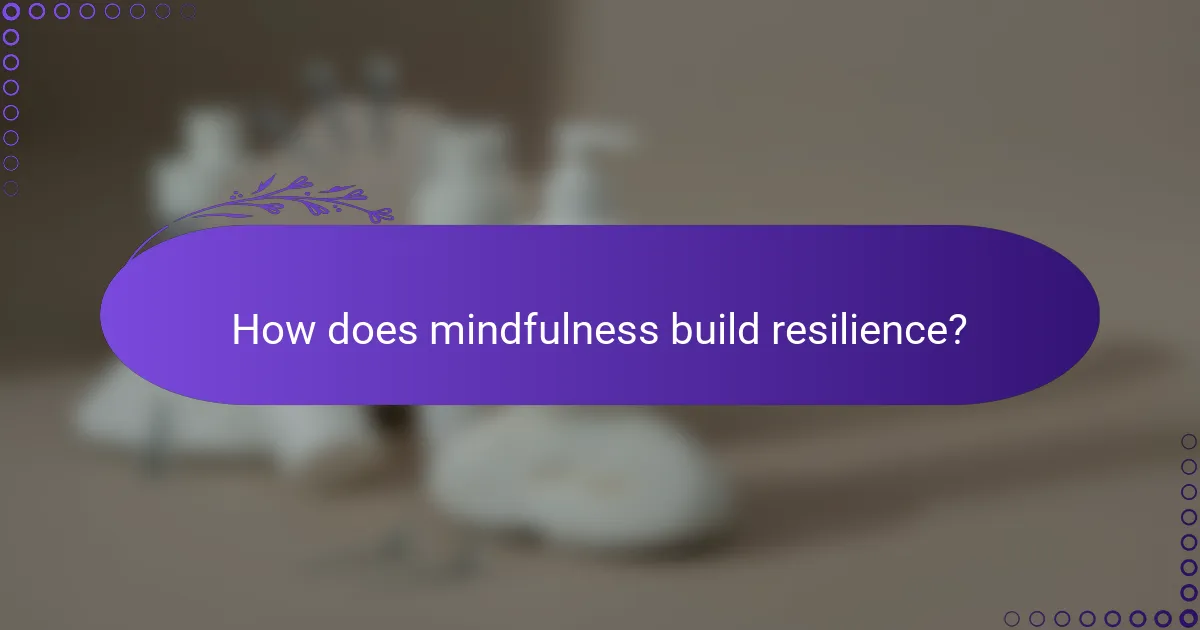
How does mindfulness build resilience?
Mindfulness builds resilience by helping individuals manage stress and respond effectively to challenges. By fostering a present-focused awareness, it enables people to navigate difficulties with greater ease and adaptability.
Encourages positive thinking
Mindfulness encourages positive thinking by promoting an awareness of negative thought patterns and allowing individuals to reframe their perspectives. Practicing mindfulness techniques, such as meditation or deep breathing, can help shift focus from anxiety-inducing thoughts to more constructive ones.
For instance, when faced with a stressful situation, a mindful approach might involve recognizing the stress without judgment and consciously choosing to focus on potential solutions or positive outcomes. This shift can significantly enhance overall mental well-being.
Fosters adaptability
Mindfulness fosters adaptability by training the mind to remain flexible in the face of change. By regularly practicing mindfulness, individuals learn to accept uncertainty and adjust their responses to new circumstances, which is crucial for resilience.
For example, someone who practices mindfulness may find it easier to cope with unexpected changes at work or in personal life, as they are better equipped to manage their emotional responses and maintain a balanced outlook.
Strengthens coping strategies
Mindfulness strengthens coping strategies by equipping individuals with tools to handle stress and adversity more effectively. Techniques such as mindful breathing or body scans can serve as immediate resources during challenging moments.
Incorporating mindfulness into daily routines can lead to the development of healthier coping mechanisms, such as taking a moment to breathe deeply before reacting to stressors. This proactive approach can prevent escalation of anxiety and promote a calmer response.
Enhances self-awareness
Mindfulness enhances self-awareness by encouraging individuals to observe their thoughts and feelings without judgment. This heightened awareness allows for a better understanding of personal triggers and emotional responses, which is essential for building resilience.
By regularly engaging in mindfulness practices, such as journaling or meditation, individuals can gain insights into their behavior patterns and emotional states. This knowledge empowers them to make informed choices that support their mental health and resilience in the long run.
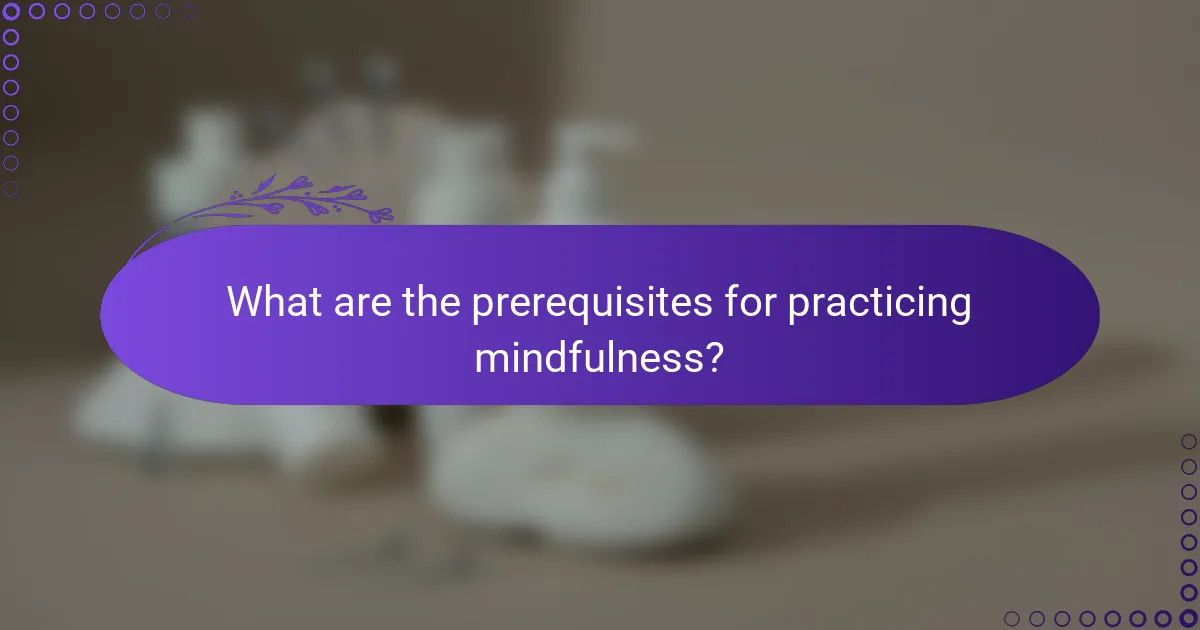
What are the prerequisites for practicing mindfulness?
Practicing mindfulness effectively requires certain prerequisites that enhance the experience and outcomes. Key factors include a willingness to engage, consistency in practice, and open-mindedness, all of which contribute to building resilience and overcoming anxiety.
Willingness to engage
A genuine willingness to engage in mindfulness is crucial for its effectiveness. This means being open to exploring your thoughts and feelings without judgment. When you commit to the practice, you create a space for self-discovery and emotional growth.
To foster this willingness, start with short sessions, perhaps just five to ten minutes a day. Gradually increase the duration as you become more comfortable. Remember, the goal is to be present, not perfect.
Consistency in practice
Consistency is vital for reaping the benefits of mindfulness. Regular practice helps to reinforce the skills you develop, making it easier to manage anxiety and stress over time. Aim for daily practice, even if it’s brief.
Consider setting a specific time each day for mindfulness, such as in the morning or before bed. Using reminders or mindfulness apps can help you stay on track and build a routine that fits your lifestyle.
Open-mindedness
Open-mindedness allows you to approach mindfulness without preconceived notions or expectations. This attitude fosters a deeper understanding of your experiences and promotes acceptance of whatever arises during practice.
To cultivate open-mindedness, try to observe your thoughts and feelings with curiosity rather than judgment. Embrace the idea that every session will be different, and that’s perfectly okay. This mindset can lead to greater insights and resilience over time.
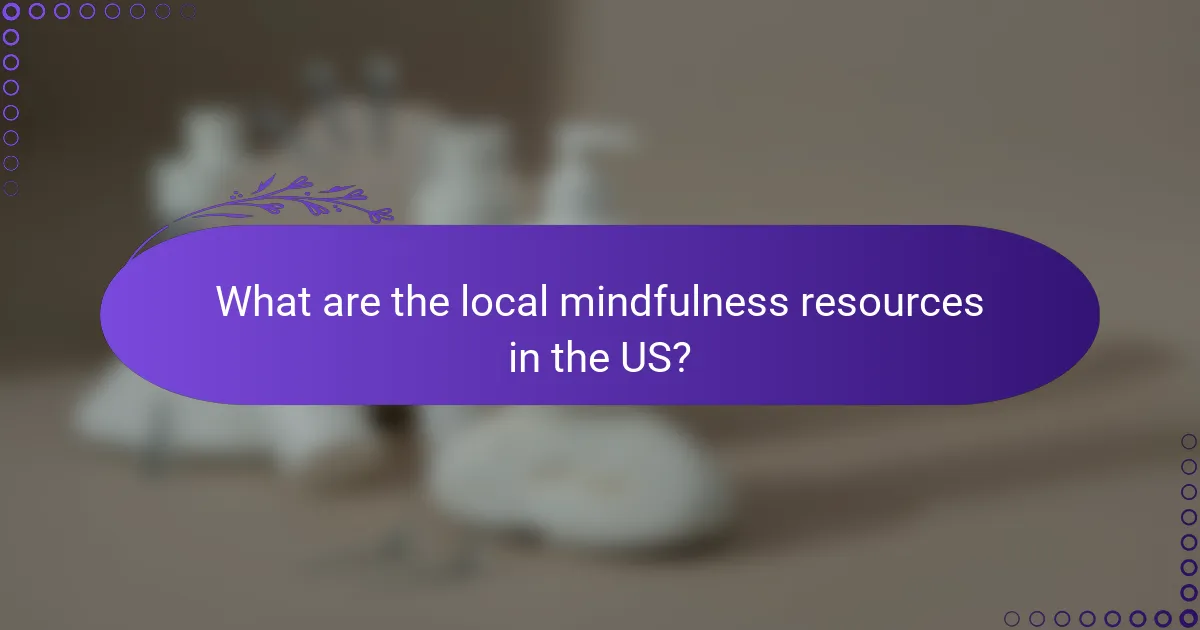
What are the local mindfulness resources in the US?
In the US, numerous mindfulness resources are available to help individuals manage anxiety and enhance resilience. These include structured programs, local meditation centers, and online platforms that offer a variety of mindfulness practices.
Mindfulness-based stress reduction programs
Mindfulness-based stress reduction (MBSR) programs are structured courses designed to teach mindfulness techniques to reduce stress and anxiety. Typically lasting eight weeks, these programs combine meditation, body awareness, and yoga to cultivate mindfulness skills.
Participants often meet weekly for group sessions, which may include guided meditations and discussions. Many programs are offered through hospitals, community centers, and universities, making them accessible across the country.
When choosing an MBSR program, look for certified instructors and consider the program’s format, whether in-person or online, to find what suits your needs best.
Local meditation centers
Local meditation centers provide a supportive environment for practicing mindfulness and meditation. These centers often offer classes, workshops, and retreats focused on various meditation styles, including Zen, Vipassana, and loving-kindness meditation.
Many centers also host community events, allowing individuals to connect with others on similar journeys. To find a meditation center near you, search online directories or local community boards for listings and reviews.
Before attending, check if the center offers introductory sessions or drop-in classes, which can help you gauge the atmosphere and teaching style without a long-term commitment.
